Social Watch news
Published on Fri, 2012-12-14 08:45
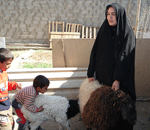
Iraqi widow with her sons.
(Photo: CODEPINK Women
For Peace/Flickr/CC)
|
Political disputes and security challenges have hindered the stability required for the development of Iraq, according to the Iraqi Al Amal Association’s contribution to the Social Watch Report 2013. To get on the right track, says Al Amal, the Iraqi government must conduct the census that has been delayed since 2007, to collect reliable information for the design of comprehensive, effective and appropriately funded development plans.
|
Published on Fri, 2012-12-14 08:42
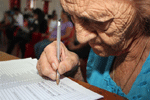
A Salvadorean woman learns to
write and read. (Photo: MINED)
|
The first leftist government in El Salvador has been devoted, in the last three years, to support marginalized populations such as the elderly, women, children and the rural population, says the Salvadorean contribution to the Social Watch Report 2013. Improvements in health and education are apparent, but structural changes are needed to ensure the sustainability of the social programs, including a tax reform to finance them with the national budget without relying on external funds.
|
Published on Fri, 2012-12-14 08:38
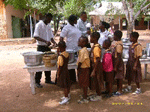
School lunch in Ghana
(Photo: Ndcuk.org)
|
The lack of political will seems to be the main obstacle on Ghana’s road to development and human well-being, but it is not the only one, according to the contribution from civil society organizations of this West African nation to the Social Watch Report 2013.
Ghana has walked a long way towards poverty eradication, food security and education to all, but not all the people have access to medical services, and not all pregnant woman benefit from free health care, so maternal mortality remains very high, aggravating the endemic gender inequities. With this social landscape as a backdrop, the economy experiences a sustained growth, notes the report.
|
Published on Fri, 2012-12-14 08:35

Photo: The Palestinian Monitor
|
The military raid on the offices in Ramallah of the Palestinian NGO Network (PNGO, member of Social Watch), Women’s Union and Addameer “adds to the Israeli record of continuous violation” of the international humanitarian law and human rights treaties, and proved once again that the occupation “is the major (…) obstacle” that prevents the Palestinian society from reaching its development, stated the Arab NGO Network for Development.
|
Published on Fri, 2012-12-14 07:40
The international conference “Advancing the post-2015 sustainable development agenda: Reconfirming rights, recognizing limits, redefining goals” in Bonn will bring together about 250 civil society activists and representatives from key stakeholders in March in order to draw together civil society inputs into this relevant debate.
|
Published on Fri, 2012-12-07 13:00

Members of the Alternative Budget
Institute (ABI), a consortium of 60
non-governmental organizations
led by Social Watch Philippines,
called on citizens to vote only for
candidates supporting the MDGs.
(Photo: ABI-ENVI)
|
The Philippines needs a post-2015 development agenda that reclaims human rights as the normative framework, especially ensuring the right to education, health and decent work, and addressing the long-standing inequalities, concludes the report 2013 of Social Watch-Philippines. Economic growth averaged 4.7 per cent a year since 2000 in this South Asian country, but only the elites harvested the benefits, while poverty increased to reach more than one of every four Filipinos, says the study.
|
Published on Fri, 2012-12-07 12:58

Palace of the Nation, seat of the
Belgian Federal Parliament in
Brussels.
(Photo: Belgian government)
|
“International cooperation is in danger. In Europe, which is still the biggest donor in the world, official development assistance fell for the first time since 2007, and Belgium is not an exception. In times of crisis the tendency is for fiscal austerity”. This is the conclusion of the National Cooperation Centre for Development (CNCD-11.11.11) in its contribution to the Social Watch Report 2013.
|
Published on Fri, 2012-12-07 12:55
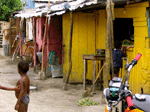
Living in the Batey Libertad.
(Photo: Yspaniola.org)
|
To put an end to poverty, the authorities in the Dominican Republic must promote the equitable distribution of wealth, broaden and improve the quality of education, health services, employment and social security, and implement policies to help the poorest and most vulnerable people. But, according to civil society organizations in their contribution to the Social Watch Report 2013, the official rhetoric about social investment and human development is contradicting by an economic policy of cutting expenditures and increasing taxes, in accordance with conditions imposed by the International Monetary Fund.
|
Published on Fri, 2012-11-30 06:50

Pro-democratic demonstration
in Asunción, in june.
(Photo: Decidamos-Paraguay)
|
“The social contract was broken” in Paraguay by the “parliamentary coup” that ousted President Fernando Lugo on 22 June 2012, informs Decidamos, a campaign for citizen rights, in its contribution to the Social Watch report 2013.
Lugo became president with 41% of the votes, and in 2011, three years into his Administration, he had the approval of 50% of the population.”
|
Published on Thu, 2012-11-29 09:29
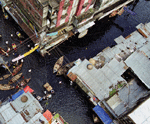
Dhaka, capital city of
Bangladesh, under the water in
2004. (Photo: EquityBD)
|
The international community must rule out the “one size fits all” approach and design an “effective sets of goals” needed to ensure a sustainable development, letting the solutions to be defined by each country, recommends the Social Watch coalition in Bangladesh, a nation severely affected by climate change. The new framework must ensure “equity”, “justice”, “the preservation of Mother Earth and the life and livelihood of all human beings,” adds the Bangladeshi contribution to the Social Watch Report 2013.
|
SUSCRIBE TO OUR NEWSLETTER
Submit

|











